If you’ve ever asked your pastor or Sunday school teacher, “Who wrote the Bible?” you probably got one of two responses:
- “God wrote the Bible.” The Holy Spirit moved prophets like Moses and apostles like Paul to write about God’s relationship with the world (1 Ti 3:16; 2 Pe 1:20–21).
- “About 40 people wrote the Bible.” The individual books were written by many authors over many years in many places to many different people groups.
In a way, both of these answers are true, but by now you’re probably looking for a little more detail about the authors of the Bible. And rightly so: when you’re studying a book or passage of the Bible, it’s pretty important to know who wrote it.
But there’s a lot of nuance that goes into answering this question. The Bible didn’t fall out of heaven, and it was a long time in the making.
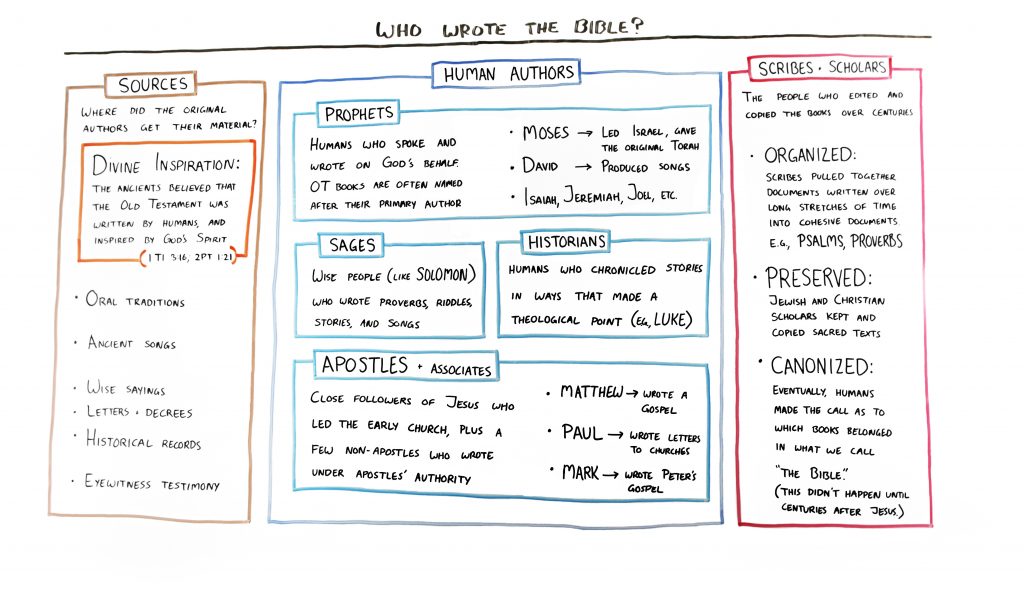
So, let’s take a closer look at the people whom tradition says wrote the Bible. Before we jump into the list of names, let me throw out a few disclaimers:
- This is a list of authors either identified in the Bible’s text itself or generally assumed by church/Jewish tradition. I’ve included a few candidates for anonymous works (like Moses, Ezra, and Matthew).
- There are more authors of the Bible than the 35 I’ve listed here. For example, somebody wrote Judges, but we don’t know who. There really were around 40 authors of the Bible, but the Bible and tradition only call out around 35 by name.
- Ancient attribution and modern attribution aren’t even really in the same ball park. For example, the book of Isaiah may have been partially composed and arranged by Isaiah’s disciples long after Isaiah’s death. But New Testament writers still refer to the words in the book as though they were Isaiah’s.
- I do not know who wrote Hebrews.
First, a chart for the visual learners:
In case you’re just here for the list of names, here you go!

(I also made a poster with some fun facts about the authors of the Bible. It’s perfect for Sunday school classrooms and church offices.)
Heads up: this is a really long article. On to the nitty-gritty details …
The 35 traditional authors of the Bible
1. Moses (Genesis | Exodus | Leviticus | Numbers | Deuteronomy | Psalms)
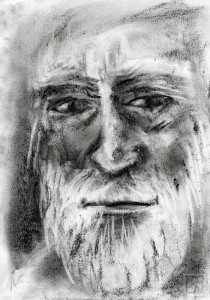
Moses is the prophet who leads Israel from slavery in Egypt to the edge of the promised land. He also wrote about 20% of your Bible. Of all the Old Testament prophets, nobody’s like Moses (Dt 34:10–12).
Moses is a Hebrew born in Egypt and raised in Pharaoh’s house. After killing an abusive Egyptian slave driver, Moses escapes the death penalty by running to the wilderness, where he marries and takes up life as a shepherd. Forty years go by, and God meets Moses in the wilderness (there’s a burning bush involved).
God commissions Moses: tell Pharaoh to let the Israelites go. Moses does so, Pharaoh resists, God judges Egypt with 10 plagues, and the Israelites leave. Moses takes the new nation to Mount Sinai, where the Lord brings Israel into a special relationship: from now on, Israel is God’s people, and God is Israel’s deity. Moses writes out the details of what that relationship looks like. These details are called the “Law,” and they take up most of the books attributed to Moses in the Bible.
The first book, Genesis, sets the stage for the other four books. It explains where the Jewish people came from, and how they ended up in Egypt. The next four books chronicle Israel’s physical and spiritual journey from Egypt to the promised land.
But Moses’ works aren’t over at Deuteronomy! He’s also the one who wrote Psalm 90.
2. Ezra (1 & 2 Chronicles | Ezra)
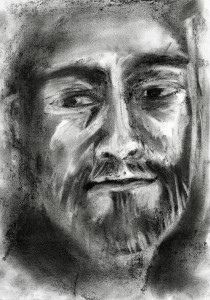 Ezra is born long, long after Moses. But like the ancient prophet, Ezra leads a group of Israelites from exile in another nation back to the promised land.
Ezra is born long, long after Moses. But like the ancient prophet, Ezra leads a group of Israelites from exile in another nation back to the promised land.
Ezra is a scribe (someone who reads, writes, and interprets documents), and he’s especially well-versed in the Law of Moses (Ezra 7:6). He’s actually related to Moses: Ezra is a great-great-great(…)-grandson of Moses’ brother Aaron, which means he’s also got some priest blood in him (7:1–5). Ezra grows up in Babylon, but he is determined to move to become a missionary to his homeland (7:10), so he takes a group of Jews back to Jerusalem and begins teaching the people God’s ways.
Ezra is a key player in the books of Ezra and Nehemiah. He’s a religious leader in Jerusalem who calls the people around him to holiness.
The Jewish Talmud says Ezra wrote the book of 1 & 2 Chronicles (yes, they’re really two parts of the same book), and the book of Ezra. If this is the case, it makes Ezra the second-most prolific author of the Bible. Not bad for a guy you never hear about, right?
3. Nehemiah (Nehemiah)
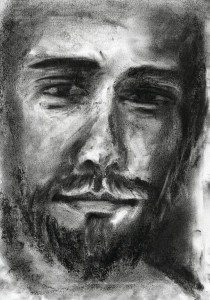 Nehemiah is a cupbearer to the king of Persia when he gets some disturbing news: his countrymen back in Jerusalem are in dire straits, and the city is in shambles (Neh 1:3). Nehemiah then gets the go-ahead from King Artaxerxes to rebuild the city walls and gates, and takes off for Jerusalem.
Nehemiah is a cupbearer to the king of Persia when he gets some disturbing news: his countrymen back in Jerusalem are in dire straits, and the city is in shambles (Neh 1:3). Nehemiah then gets the go-ahead from King Artaxerxes to rebuild the city walls and gates, and takes off for Jerusalem.
And get this: he gets the wall rebuilt in just 52 days (6:15).
Nehemiah’s more than a wallbuilder, though. Artaxerxes makes him the governor of Judah (Neh 5:14), and Nehemiah uses this position to point the people to God. He’s the one stationing soldiers, commissioning singers in the temple, and making sure the temple stays clean. Plus, he teams up with Ezra to rededicate the people to God (10:28–39) and hold them to their promises (13:4–31).
Nehemiah wrote the book that bears his name—and he wrote it in first person. Nehemiah has a very transparent writing style, often breaking from his story to record a prayer he made to God (4:4; 13:22).
4. David (Psalms)
 You’ve all heard of this guy. He’s the shepherd boy who killed Goliath the giant. He’s the war-hero king who delivered Israel from her enemies and established Jerusalem as the capital of Israel. He’s the jerk who killed off Uriah so he could have Uriah’s wife. And maybe most importantly, he’s a messiah: someone anointed by God to rule the people in wisdom and justice.
You’ve all heard of this guy. He’s the shepherd boy who killed Goliath the giant. He’s the war-hero king who delivered Israel from her enemies and established Jerusalem as the capital of Israel. He’s the jerk who killed off Uriah so he could have Uriah’s wife. And maybe most importantly, he’s a messiah: someone anointed by God to rule the people in wisdom and justice.
David is the focal character in the books of 1 & 2 Samuel and 1 & 2 Chronicles, and the books of Ruth and Kings tell us all about his family. David’s one of the Bible’s most important characters, but that doesn’t have all that much to do with David. He’s important because God makes a special promise to him: from David will come an everlasting kingdom with an everlasting king. Spoiler alert: that’s Jesus.
Somebody may have told you that David wrote the book of Psalms, but that’s not really the case. David only wrote about half of the Psalms—73 out of all 150, to be precise (though the Latin Vulgate and Septuagint credit a few more to him). Even so, that’s a lot more than any other psalmist.
These ones are his, specifically:
- Psalms 3–9
- Psalms 11–41
- Psalms 51–65
- Psalms 68–70
- Psalm 86
- Psalm 101
- Psalm 103
- Psalms 108–110
- Psalm 122
- Psalm 124
- Psalm 131
- Psalm 133
- Psalms 138–145
If you throw in the Septuagint (the Greek translation of the Old Testament) and Latin Vulgate credits, it brings the count as high as 85.
Sidenote: another common myth about the book of Psalms is that it’s the longest book of the Bible. But that’s not really true, either.
5. Solomon (Psalms | Proverbs | Ecclesiastes | Song of Solomon)
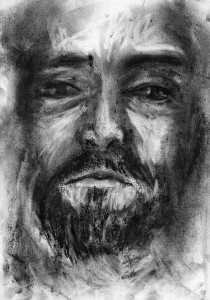 When Solomon succeeds his father David as king of all Israel, the Lord appears to him in a dream. He gives Solomon the ultimate “blank check”: Solomon names anything he wants, and God will give it to him. Instead of asking for cash or the heads of his enemies, Solomon just asks God for wisdom. And boy, does God deliver:
When Solomon succeeds his father David as king of all Israel, the Lord appears to him in a dream. He gives Solomon the ultimate “blank check”: Solomon names anything he wants, and God will give it to him. Instead of asking for cash or the heads of his enemies, Solomon just asks God for wisdom. And boy, does God deliver:
Now God gave Solomon wisdom and very great discernment and breadth of mind, like the sand that is on the seashore. Solomon’s wisdom surpassed the wisdom of all the sons of the east and all the wisdom of Egypt. For he was wiser than all men, than Ethan the Ezrahite, Heman, Calcol and Darda, the sons of Mahol; and his fame was known in all the surrounding nations. (1 Ki 4:29–31)
Solomon came up with 3,000 proverbs and 1,005 songs (1 Ki 4:32). Lucky for us, a lot of that wisdom is part of our Bibles.
Solomon is traditionally credited for authoring the books of Ecclesiastes and Song of Solomon. In the first, he asks, “What’s the point of even existing?” In the second, he celebrates love, marriage, and all kinds of sexual privileges that come with that.
Solomon contributes to two more books of the Bible as well. He’s the main writer in Proverbs, which is a book of principles for making decisions in wisdom and justice. Most of the first 29 chapters were written or curated by Solomon. The wise king also joins his dad in the book of Psalms: numbers 72 and 127 are Solomon’s.
6. Asaph and family (Psalms)
W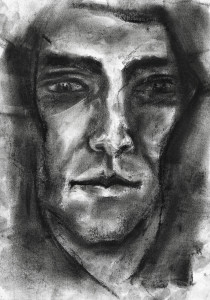 hen David commissions the temple in Jerusalem, he appoints Asaph and his family to lead worship (1 Ch 16:5). We don’t know much about Asaph, except that he’s a singer from the tribe of Levi (2 Ch 5:12). He and his family must have been some awesome songwriters, because 12 of the Psalms are credited to him (Ps 50; 73–83).
hen David commissions the temple in Jerusalem, he appoints Asaph and his family to lead worship (1 Ch 16:5). We don’t know much about Asaph, except that he’s a singer from the tribe of Levi (2 Ch 5:12). He and his family must have been some awesome songwriters, because 12 of the Psalms are credited to him (Ps 50; 73–83).
7. Sons of Korah (Psalms)
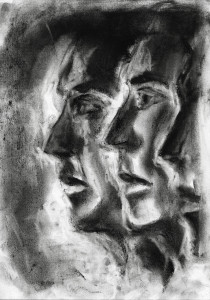 When Moses is leading Israel through the wilderness, a Levite named Korah challenges Moses’ leadership. That doesn’t end well—the earth swallows up Korah and his followers.
When Moses is leading Israel through the wilderness, a Levite named Korah challenges Moses’ leadership. That doesn’t end well—the earth swallows up Korah and his followers.
But Korah’s sons survive, and they have quite a legacy in the Bible through their music. The descendants of Korah wrote 11 psalms:
8. Heman (Psalms)
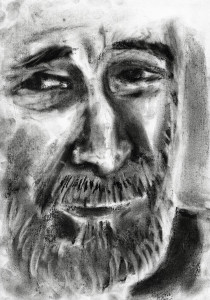 Before anyone gets overly excited, no, a Masters of the Universe character did not author part of the Bible (as far as I can tell). But the similarity in name is pretty funny.
Before anyone gets overly excited, no, a Masters of the Universe character did not author part of the Bible (as far as I can tell). But the similarity in name is pretty funny.
Heman was a wise man who co-authored the eighty-eighth psalm with the sons of Korah. He was wise enough to compare to Solomon, but not wiser (1 Ki 4:31).
9. Ethan (Psalms)
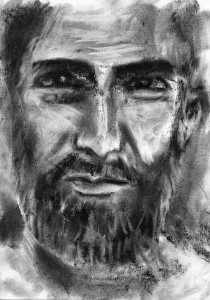 Oh, look, another psalmist! Like his relative Heman, Ethan was one of the wisest men in the world. You know, besides Solomon (1 Ki 4:31). He wrote Psalm 89.
Oh, look, another psalmist! Like his relative Heman, Ethan was one of the wisest men in the world. You know, besides Solomon (1 Ki 4:31). He wrote Psalm 89.
10. Agur (Proverbs)
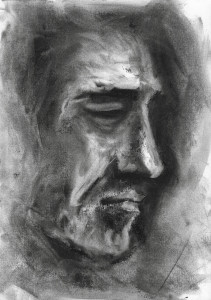 We don’t know much about the author of Proverbs 30. He must have been wise enough for the Jews to include in their book of wisdom, but he doesn’t think to highly of his smarts compared to God’s:
We don’t know much about the author of Proverbs 30. He must have been wise enough for the Jews to include in their book of wisdom, but he doesn’t think to highly of his smarts compared to God’s:
Surely I am more stupid than any man,
And I do not have the understanding of a man.
Neither have I learned wisdom,
Nor do I have the knowledge of the Holy One. (Pr 30:2–3)
11. Lemuel (Proverbs)
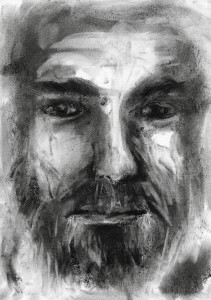 Again, the Bible tells us very little about this author. Lemuel was a king. possibly of a place called Massa (31:1). Some Bibles translate his intro to call him the “king of Massa,” but we’re not sure where that would be.
Again, the Bible tells us very little about this author. Lemuel was a king. possibly of a place called Massa (31:1). Some Bibles translate his intro to call him the “king of Massa,” but we’re not sure where that would be.
Here’s something cool about Lemuel: his contribution to the Bible is pretty much a tribute to his mom. She taught her son well, and now he’s passing on her wisdom to his readers.
12. Isaiah (Isaiah)
Isaiah is the earliest,and arguably the most preeminent of the Major Prophets. His ministry spans the reign of four kings, and he seems to be responsible for some of the royal records (2 Ch 2622; 32:32). Isaiah marries a prophetess (Is 8:3) and has two sons.
In addition to proclaiming the word of God to the nation, Isaiah gives personal advise to the kings of Judah. He tells King Ahaz not to worry when the kingdom of Israel and Aram make war against Jerusalem (Is 7:3–4). He reassures King Hezekiah that the Lord will protect Judah from Assyrian armies (2 Ki 19:1–7; Is 37:1–7), but warns him that Jerusalem will one day be sacked by the Babylonians (Is 39:5–7).
And of course, the book of Isaiah is traditionally credited to him (though his disciples seem to have contributed to the body of work overtime). His prophecies cover the rise of Persian emperor Cyrus, the birth, death, and resurrection of Jesus, and the coming kingdom of God.
13. Jeremiah (Jeremiah | Lamentations)
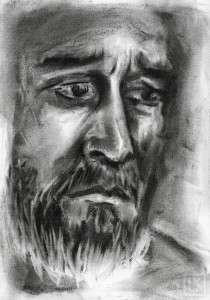 He’s the famous “weeping prophet” from the priests in the land of Benjamin (Jer 1:1). Jeremiah begins his prophetic ministry at a young age (Jer 1:6), and spends most of his time warning the nation of Judah that judgment is coming. He warns them about multiple Babylonian attacks, but the kings of Judah just won’t hear it. Jeremiah outlasts all the kings, though, and ends up offering counsel to the refugees of Jerusalem and the surrounding area. But even they don’t listen.
He’s the famous “weeping prophet” from the priests in the land of Benjamin (Jer 1:1). Jeremiah begins his prophetic ministry at a young age (Jer 1:6), and spends most of his time warning the nation of Judah that judgment is coming. He warns them about multiple Babylonian attacks, but the kings of Judah just won’t hear it. Jeremiah outlasts all the kings, though, and ends up offering counsel to the refugees of Jerusalem and the surrounding area. But even they don’t listen.
Jeremiah is like the Peter Parker of the Bible: the dude just can’t catch a break.
Books of the Bible Jeremiah wrote
Forget what you’ve been told about Psalms: Jeremiah is actually the longest book of the Bible. And that’s not all of Jeremiah’s writings. According to tradition, Jeremiah wrote the book of Lamentations, too. This book is a group of five acrostic poems that mourn the fall of Jerusalem. Jeremiah also wrote a few more dirges when the good king Josiah died in battle (2 Ch 35:25).
14. Ezekiel (Ezekiel)
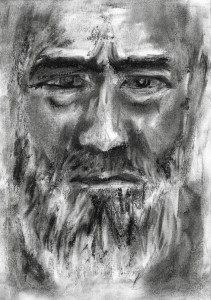 Ezekiel is one of the many Jews taken captive to Babylon (Ezek 1:1). He’s a priest from the tribe of Levi (1:3), but the Lord chooses him to do much more than make sacrifices. God sets up Ezekiel as the “watchman” for the Jews, because as bad as it is now, they’re about to get themselves into a lot more trouble.
Ezekiel is one of the many Jews taken captive to Babylon (Ezek 1:1). He’s a priest from the tribe of Levi (1:3), but the Lord chooses him to do much more than make sacrifices. God sets up Ezekiel as the “watchman” for the Jews, because as bad as it is now, they’re about to get themselves into a lot more trouble.
Ezekiel makes a lot of sacrifices in his ministry. He eats cakes cooked over poop (4:12–15). He lies on his side for 430 days(4:4–6). His wife dies, but he doesn’t get a chance to mourn (24:15–24). He doesn’t have it easy.
But his prophecies are phenomenal. He sees the Lord enthroned above the cherubim (10:1–2). He sees the temple of God destroyed and rebuilt. He sees dry bones growing ligaments and flesh. He’s the watchman, and he watches some crazy things.
15. Daniel (Daniel)
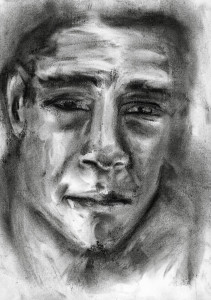 You’ve heard of this guy and his lion’s den episode. Daniel is a young nobleman from Judah who’s taken captive by King Nebuchadnezzar (Da 1:3, 6). Exiled to Babylon, Daniel quickly distinguishes himself from the other boys for his wisdom (1:20), and he’s one of the few characters in the Bible that reliably interprets other people’s dreams (2:28). He becomes a chief government officer in both the Babylonian and Persian empires (2:48; 5:29; 6:1–3).
You’ve heard of this guy and his lion’s den episode. Daniel is a young nobleman from Judah who’s taken captive by King Nebuchadnezzar (Da 1:3, 6). Exiled to Babylon, Daniel quickly distinguishes himself from the other boys for his wisdom (1:20), and he’s one of the few characters in the Bible that reliably interprets other people’s dreams (2:28). He becomes a chief government officer in both the Babylonian and Persian empires (2:48; 5:29; 6:1–3).
And he also has some pretty intense visions. His prophecies tend to concern two major themes.
- The future of the world’s kingdoms: Babylon, Persia, Greece, Rome, and the unshakable kingdom of God.
- The future of God’s people: the Messiah, the temple, and Israel’s part in God’s long-term plan.
Daniel’s a wise man and he wrote an important book for those who want to study biblical prophecy.
16. Hosea (Hosea)
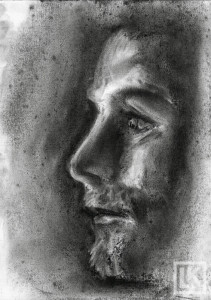 Hosea’s claim to fame: God told him to enter a really unhealthy marriage.
Hosea’s claim to fame: God told him to enter a really unhealthy marriage.
Seriously, God has Hosea marry a prostitute and have a few kids (Hos 1:2). And Hosea does. When his wife takes up her old trade and starts sleeping with other men, God tells him to go bring her back home as his wife again.
Why? Because Israel has turned away from her relationship to God and chased idols instead. Israel is going to deal with the consequences of her actions, but the Lord plans to bring her back to him, just like Hosea brings back his wife (3:5).
17. Joel (Joel)
 All we know about this prophet is his father’s name: Pethuel. Joel writes a brief book of prophecy that explains two important phenomenon: the current plague of locusts and the coming day of the Lord.
All we know about this prophet is his father’s name: Pethuel. Joel writes a brief book of prophecy that explains two important phenomenon: the current plague of locusts and the coming day of the Lord.
18. Amos (Amos)
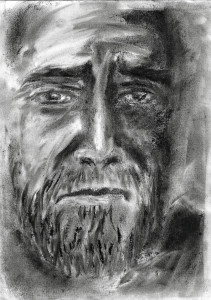 Amos is a shepherd from Tekoa, a little town in the Southern Kingdom of Judah. The Lord gives him visions and calls him to journey north to prophesy against the king of Israel. As you can imagine, the false priests in Israel want to shut this Southerner down (Am 7:12–13).
Amos is a shepherd from Tekoa, a little town in the Southern Kingdom of Judah. The Lord gives him visions and calls him to journey north to prophesy against the king of Israel. As you can imagine, the false priests in Israel want to shut this Southerner down (Am 7:12–13).
Amos is an interesting character in that it seems he has no background in public ministry. When the false priest Amaziah tells Amos to go prophesy somewhere else, Amos responds: “I am not a prophet, nor am I the son of a prophet; for I am a herdsman and a grower of sycamore figs (Am 7:14).”
19. Obadiah (Obadiah)
 We don’t know much about this guy, except that he made a short prophecy against Edom. We don’t even get an “Obadiah, son of X” intro to his book, either, so we really don’t have much to go on.
We don’t know much about this guy, except that he made a short prophecy against Edom. We don’t even get an “Obadiah, son of X” intro to his book, either, so we really don’t have much to go on.
But hey, if you love underdogs, you should check out his book. It’s the least-read book of the Bible!
20. Jonah (Jonah)
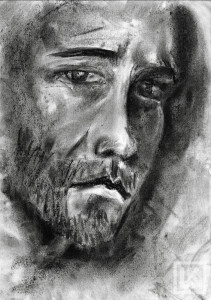 One of the more famous characters in the Bible (albeit his is one of the least-read books). Jonah is a prophet to the Northern Kingdom of Israel (2 Ki 14:25), but the Lord sends him to Nineveh to warn the Assyrians of God’s coming judgment. Jonah sails in the other direction instead, gets thrown overboard, and spends three days in the belly of a big fish.
One of the more famous characters in the Bible (albeit his is one of the least-read books). Jonah is a prophet to the Northern Kingdom of Israel (2 Ki 14:25), but the Lord sends him to Nineveh to warn the Assyrians of God’s coming judgment. Jonah sails in the other direction instead, gets thrown overboard, and spends three days in the belly of a big fish.
The fish spits him up, and Jonah is again called to preach in Nineveh. This time, Jonah obeys. But when the Ninevites repent, God spares them—and Jonah isn’t too pleased about that.
He is traditionally credited as the author of Jonah. If that’s the case, he must have had a moment of clarity after the events took place.
21. Micah (Micah)
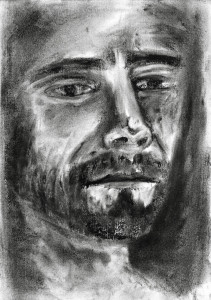 Micah is a prophet from Moreshetch in the Southern Kingdom of Judah, but he preaches to both the people in both the North and the South (Mic 1:1). We don’t know much more about Micah, but we do know that by the time of Jeremiah (around a century later), the elders in Judah considered him to be a true prophet.
Micah is a prophet from Moreshetch in the Southern Kingdom of Judah, but he preaches to both the people in both the North and the South (Mic 1:1). We don’t know much more about Micah, but we do know that by the time of Jeremiah (around a century later), the elders in Judah considered him to be a true prophet.
In fact, the people quote Micah to save Jeremiah from the death sentence. When Jeremiah prophesies that Jerusalem and the temple will be sacked, the priests and false prophets try to get him killed (Jer 26:8, 11). But the officials and the people of the city remember Micah’s prophecies against Jerusalem, and stop the priests from murdering Jeremiah (26:17–19).
22. Nahum (Nahum)
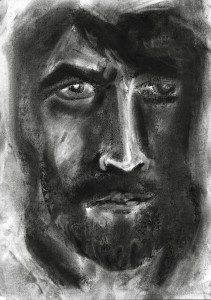 Nahum is a prophet, and calls himself an “Elkoshite” in his oracle against Nineveh (Na 1:1). We’re really not sure where Elkosh is, and so we don’t know much more about Nahum.
Nahum is a prophet, and calls himself an “Elkoshite” in his oracle against Nineveh (Na 1:1). We’re really not sure where Elkosh is, and so we don’t know much more about Nahum.
23. Habakkuk (Habakkuk)
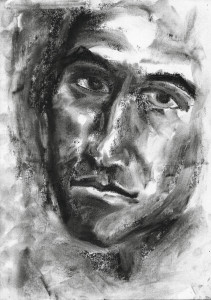 We don’t know much about this minor prophet, aside from his songwriting ability. The third chapter of his book is a prayer-psalm, one of the only shiggaion examples in the Bible ( Hab 3:1).
We don’t know much about this minor prophet, aside from his songwriting ability. The third chapter of his book is a prayer-psalm, one of the only shiggaion examples in the Bible ( Hab 3:1).
24. Zephaniah (Zephaniah)
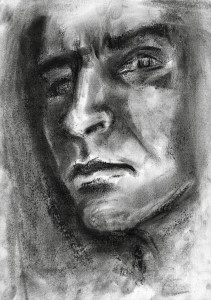 Zephaniah has some royal blood in him. He opens his tiny book of the Bible with his genealogy—which traces back to Hezekiah, the righteous king (Zep 1:1).
Zephaniah has some royal blood in him. He opens his tiny book of the Bible with his genealogy—which traces back to Hezekiah, the righteous king (Zep 1:1).
25. Haggai (Haggai)
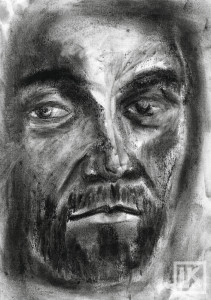 Haggai writes a very brief account of his ministry in the Bible. He encourages the Jews to finish rebuilding the temple of God, and his ministry is noteworthy enough for the scribe Ezra to give him a nod (Ezr 5:1–2). His recorded ministry spans about three months and 24 days (Hag 1:1; 2:10).
Haggai writes a very brief account of his ministry in the Bible. He encourages the Jews to finish rebuilding the temple of God, and his ministry is noteworthy enough for the scribe Ezra to give him a nod (Ezr 5:1–2). His recorded ministry spans about three months and 24 days (Hag 1:1; 2:10).
Haggai is the most specific of the Minor Prophets when it comes to dates: he gives the month and day of every message God sends him. Way to clock in your hours, Haggai!
26. Zechariah (Zechariah)
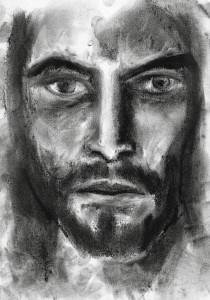 Zechariah’s ministry gears up about halfway through Haggai’s (Zec 1:1), and he too encourages the people to get off their duffs and complete the temple (Ezr 5:1–2). Like Jeremiah, Zechariah begins delivering messages from God as a young man (Zec 2:4). He wrote down his visions and messages, giving us the book of Zechariah in the Bible.
Zechariah’s ministry gears up about halfway through Haggai’s (Zec 1:1), and he too encourages the people to get off their duffs and complete the temple (Ezr 5:1–2). Like Jeremiah, Zechariah begins delivering messages from God as a young man (Zec 2:4). He wrote down his visions and messages, giving us the book of Zechariah in the Bible.
In addition to being a prophet, Zechariah seems to be among the priests (Zec 7:2–5; Neh 12:16), which would mean he’s from the tribe of Levi.
27. Malachi (Malachi)
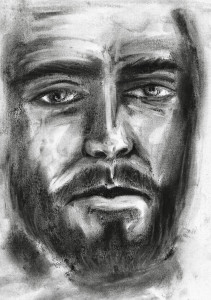 Malachi is the last of the prophets to contribute to the Old Testament. He calls the post-exilic Jews to reconnect with the Lord, but apart from this, we don’t know much about him.
Malachi is the last of the prophets to contribute to the Old Testament. He calls the post-exilic Jews to reconnect with the Lord, but apart from this, we don’t know much about him.
28. Matthew/Levi (Matthew)
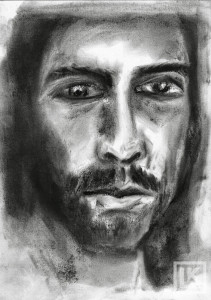 Matthew is one of the 12 apostles of Jesus, and one of the four evangelists who wrote down Jesus’s story. When we meet Matthew, he’s a tax collector for Rome. Tax collectors weren’t very popular in Israel, because they collected money from fellow Jews to pay a heathen king. But when Jesus calls Matthew to follow him, Matthew closes his booth down to serve the true King of the Jews. Then he brings Jesus over for dinner (Mt 9:9–10).
Matthew is one of the 12 apostles of Jesus, and one of the four evangelists who wrote down Jesus’s story. When we meet Matthew, he’s a tax collector for Rome. Tax collectors weren’t very popular in Israel, because they collected money from fellow Jews to pay a heathen king. But when Jesus calls Matthew to follow him, Matthew closes his booth down to serve the true King of the Jews. Then he brings Jesus over for dinner (Mt 9:9–10).
Matthew is called Levi in the other gospels, which may indicate that he’s from the tribe of Levi—we’re not sure (Mk 2:14–15; Lk 5:27–29).
29. John Mark (Mark)
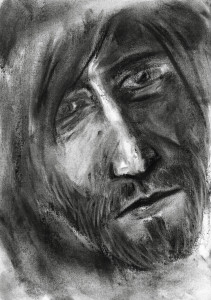 Mark’s an interesting character in the background of the New Testament. We first meet Mark in the book of Acts. When Peter miraculously escapes from prison, he goes to Mark’s mother’s house (Ac 12:12). Later, Paul and Barnabas bring Mark along on their missionary journey as a helper, but he leaves them and goes back to Jerusalem (13:5, 13). When Paul and Barnabas prepare for their second journey, Barnabas suggests bringing John Mark again, but Paul won’t hear it (15:37–38). Paul and Barnabas disagree so sharply that they split up: Barnabas takes Mark to Cyprus, and Paul starts a new missionary team (15:39–40).
Mark’s an interesting character in the background of the New Testament. We first meet Mark in the book of Acts. When Peter miraculously escapes from prison, he goes to Mark’s mother’s house (Ac 12:12). Later, Paul and Barnabas bring Mark along on their missionary journey as a helper, but he leaves them and goes back to Jerusalem (13:5, 13). When Paul and Barnabas prepare for their second journey, Barnabas suggests bringing John Mark again, but Paul won’t hear it (15:37–38). Paul and Barnabas disagree so sharply that they split up: Barnabas takes Mark to Cyprus, and Paul starts a new missionary team (15:39–40).
Mark matures, though. Decades later, Mark is considered useful to Paul (2 Ti 4:11) and a son to Peter (1 Pe 5:13). According to tradition, Mark is the one who writes down Peter’s stories of Jesus—which is how we got the Gospel of Mark.
30. Luke (Luke | Acts)
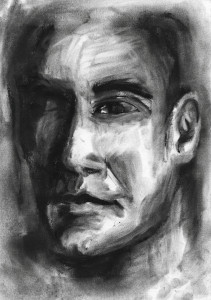 Luke is a physician who accompanies Paul through thick and thin (Co 4:14; 2 Ti 4:11). His skills probably come in handy, because Paul takes a lot of beatings (2 Co 24ff).
Luke is a physician who accompanies Paul through thick and thin (Co 4:14; 2 Ti 4:11). His skills probably come in handy, because Paul takes a lot of beatings (2 Co 24ff).
But Luke’s greatest legacy is his contribution to the New Testament. Luke write more of the NT than anyone else (yes, even more than Paul). Luke’s a meticulous journalist who sets out to record the life and ministry of Jesus in consecutive order (Lk 1:1–4), and later records the history of the early church (Ac 1:1–2). He composes these accounts on behalf of a mysterious Christian named Theophilus, who wants to learn more about his Christian faith.
31. John (John | 1 John | 2 John | 3 John | Revelation)
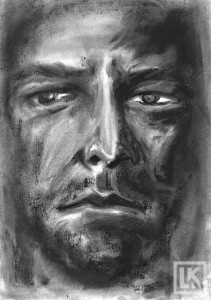 He’s another member of the 12 apostles, a former fisherman from Galilee who follows Jesus (Mk 1:19–20). The Lord gives John and his brother James the nickname “Sons of Thunder” (Mk 3:17). The Bible doesn’t say how he earned this nickname, but John does seem to have a stormy personality at times (Lk 9:51–56).
He’s another member of the 12 apostles, a former fisherman from Galilee who follows Jesus (Mk 1:19–20). The Lord gives John and his brother James the nickname “Sons of Thunder” (Mk 3:17). The Bible doesn’t say how he earned this nickname, but John does seem to have a stormy personality at times (Lk 9:51–56).
After the resurrection, John becomes a pillar of the early church (Ga 2:9). He writes a persuasive account of Jesus’ earthly ministry, death, and resurrection, and then writes four letters (the last one, Revelation, includes many apocalyptic visions). According to tradition, John becomes an elder at the church at Ephesus. He is eventually exiled to the Isle of Patmos (Rev 1:9).
Fun fact: of all the epistles in the New Testament, John writes the longest (Revelation) and the shortest (3 John). In fact, 3 John is the shortest book of the Bible.
32. Paul (Romans–Philemon)
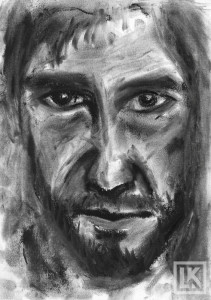 Paul may not have the word count that Moses has, but he writes more individual documents than any other biblical author—13, to be exact.
Paul may not have the word count that Moses has, but he writes more individual documents than any other biblical author—13, to be exact.
When we first meet Paul, he’s not leading the church: he’s leading the charge against it. Paul (also called Saul) kidnaps Christians from the regions around Judea and brings them to Jerusalem to suffer the punishment for blasphemy. That punishment was often prison or death (Ac 8:3; 9:1–2).
But when Jesus stops Paul on the road to Damascus, Paul is forever changed. He becomes an apostle, the face of the church to the non-Jews around the Roman empire (Ep 3:1, 8). He travels across the world planting churches and spreading the gospel of Jesus Christ.
Paul’s letters to the Christians spread across the world make up his contribution to the Bible. Some of these letters were written to churches he had planted, others were to churches he hoped to visit someday. Paul also wrote to specific leaders in the local churches, like Timothy, Titus, and Philemon.
33. James (James)
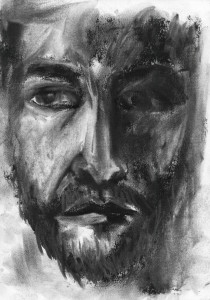 James the Just is the younger brother of Jesus (Mt 13:55; Mk 6:3), the son of Mary and Joseph. James doesn’t believe in Jesus while the Lord is going about his earthly ministry (Jn 7:5). But that all changes after Jesus rises from the dead. Jesus specifically appears to James (1 Co 15:7), and afterward James becomes one of the main leaders in the early church.
James the Just is the younger brother of Jesus (Mt 13:55; Mk 6:3), the son of Mary and Joseph. James doesn’t believe in Jesus while the Lord is going about his earthly ministry (Jn 7:5). But that all changes after Jesus rises from the dead. Jesus specifically appears to James (1 Co 15:7), and afterward James becomes one of the main leaders in the early church.
James is especially savvy when it comes to balancing freedom in Christ with respect for God’s holiness. When the church is undecided on how Gentiles should treat the Law of Moses, James settles the matter with a few pointers (Ac 15:13–21).
Later, James writes a letter to the Christian Jews scattered across the world, encouraging them to keep working out their faith. We call this letter the book of James.
34. Peter (1 Peter | 2 Peter)
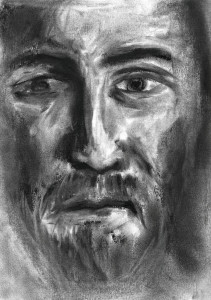 You all know Peter. He’s the leader of the 12 apostles (Mt 10:2) and a pillar in the early church (Ga 2:9). Just as Paul is entrusted with bringing the gospel to the Gentiles, Peter is the face of the gospel to the Jews (Ga 2:7).
You all know Peter. He’s the leader of the 12 apostles (Mt 10:2) and a pillar in the early church (Ga 2:9). Just as Paul is entrusted with bringing the gospel to the Gentiles, Peter is the face of the gospel to the Jews (Ga 2:7).
This guy is pretty hardcore. He walks on water (Mt 14:29), he cuts off some guy’s ear to protect Jesus (Mk 14:29, 31; Jn 18:10), and boldly declares that Jesus is the anointed one, the Christ (Mt 16:16). Yes, he’s also the one who denies Jesus three times at the Lord’s trial (Jn 18:15–16), but the resurrection totally transforms him. When the Holy Spirit comes to the church, Peter openly preaches the gospel of Jesus in the city.
Peter wrote two books of the Bible, and both are named after him. The first explains how Christians should live as aliens in this world: even though we’ll suffer, it’s nothing compared to the glory to come. The second letter urges Christians to remember what Peter has taught them even after he dies (2 Pe 1:13–14).
35. Jude (Jude)
 Jude is Jesus’ and James’ younger brother (Jude 1). Like James, he didn’t believe in Jesus during Jesus’ ministry on earth (Jn 7:5), but after the resurrection, he became a Christian. Jude writes one book of the Bible: a letter urging believers to “contend for the faith” (Jude 3–4).
Jude is Jesus’ and James’ younger brother (Jude 1). Like James, he didn’t believe in Jesus during Jesus’ ministry on earth (Jn 7:5), but after the resurrection, he became a Christian. Jude writes one book of the Bible: a letter urging believers to “contend for the faith” (Jude 3–4).
Now you know who wrote the Bible!
A lot of people contributed to this massive collection of books. If you want to learn more about where the Bible came from and what it’s all about, check out my book, The Beginner’s Guide to the Bible. It’s a non-preachy, jargon-free journey through the world’s most important book.

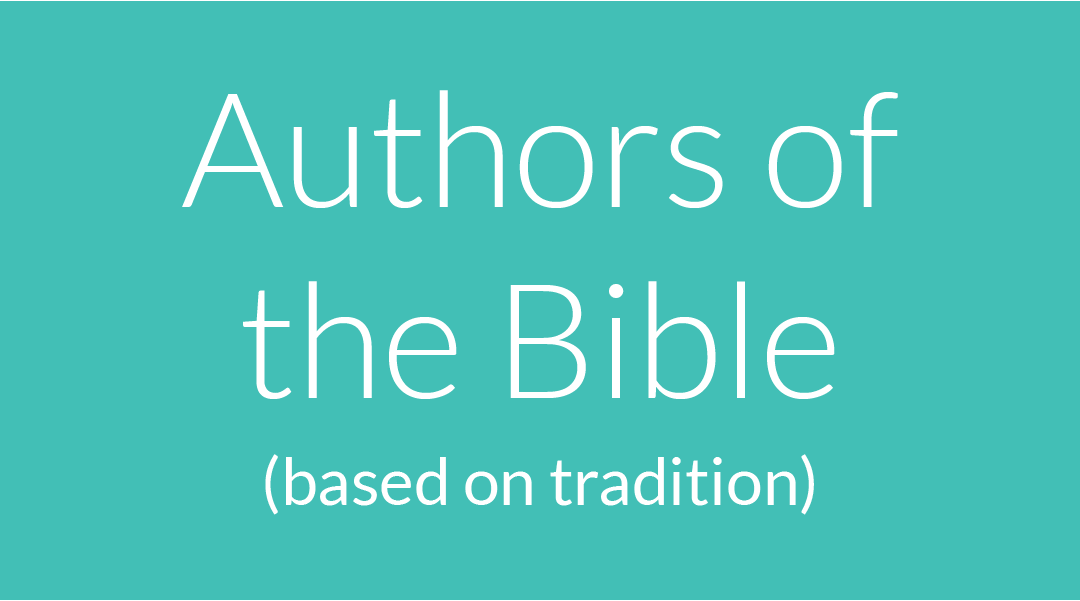
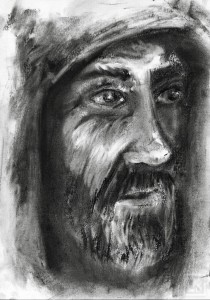



This is so helpful! Im currently in Hermeneutics study in my seminary. Thank you!
Can you tell me if Luke was the only Gentile contributor to the bible?
He’s likely the only named non-Jewish contributor to the Bible, but there may have technically been others. For example, there are two sections of Proverbs attributed to a group of people simply known as “the wise” (22:17–24:22, 24:23–34). It’s very possible that “the wise” referred to sages from other lands.
Thank you for your reply
Hi Jeffrey,
Without splitting various hairs (the comments in this thread show how fractured modern Protestant Christianity actually is thanks to the ongoing effects of the counter-reformation, etc., and I certainly don’t wish to add to it), Daniel 4 actually states that it was written by another Gentile, Nebuchadnezzar.
That said, I admire the patience and tact that you demonstrate addressing those posts that you address while sticking with a fairly traditional (and balanced) view of the Bible’s authorship. I suspect that prayer may be involved.
Blessings,
Ray
Good point (and thanks) Ray! Agreed, if we were to include the words credited to non-Jewish individuals which may or may not have been intended to be in the Scriptures, we’d have a few more names to work with. The entry by Nebuchadnezzar, plus the decrees and letters of the Persian rulers throughout Ezra stand out as examples.
Lots of potential hair-splitting to be done here—but like you, I’m not especially interested in doing so. =)
Thanks for your time and consideration and hard work may YAHWEH EL SHADDAI bless you and protect you we are grateful for the opportunity to share your beloved work it help me complete my daily research and hope you and your family have a wonderful day and stay safe. Shalom my neighbor
Agape
Thank you for compiling this document. Very easy to read and informative, the references were very helpful.
Jeffrey: Apparently you’re not aware of the excellent works by Dr. Bart Ehrman, one of them entitled: Misquoting Jesus: The Story Behind Who Changed the Bible and Why. He makes it pretty clear that (unlike your article here), Matthew, Mark, Luke, and John were NOT written by Matthew, Mark, Luke, nor John, but were written many years later by people using their names so that the works would be given an extra air of authority and be accepted.
I’m aware of Dr. Ehrman’s work, but don’t feel especially obligated to push his conclusions here. ;-)
I love the sketches. Are these available for the public? Who do I contact for copyright and republication rights?
Thanks, Jon! Feel free to use them—just please let people know where you got ’em! If you use the images (or portions of the image) anywhere digitally, you can simply link back to this page. =)
If you print them, all I ask is that you mention you sourced the art from OverviewBible.
Hi Jeffrey,
Thanks for your clear articles, which I find useful when preparing study materials for my mature students. Regarding Agur and Lemuel, you might find this article interesting https://khouse.org/articles/2005/614/. If true, this would of course add yet another author(ess) to Scripture for Chapter 31 of Proverbs, Bathsheba,
Blessings,
Ray
“Jeremiah is like the Peter Parker of the Bible: the dude just can’t catch a break.”
That sentence alone made me not only laugh at loud, but it gave me the giggles all day and when I was in a local synagogue! I, of course, had to share it with the other Jews (including the rabbi) and we all had a good laugh!
Thanks for keeping your posts simple and easy to understand. And funny
So glad it brought you joy, Ben!
FWIW, I’m not a prophet, but my Spidey-sense tells me that if you’re an “uncle” Ben, you might want to exercise caution. ;-)
Hi Laura,
The drawing are beautiful :)
Excellent and thorough work, thanks.
Putting a link in my blog to this page :)
Somebody told me there are only 39 authors of the Bible, but I don’t know where they get their source. Others have always said over 40.
Any ideas on who they may be leaving out?
There are all kinds of ways to get different counts on this. A good deal of critical scholars and early church leaders take issue with some of the traditional author attributions. The assumed number of authors goes up if you allow for authors writing under different figures’ names. (For example, while the church has pretty much always found the book of 2 Peter to be useful and valuable, but they haven’t uniformly held to the idea that it was actually penned by Simon Peter through the ages.)
Another way to increase the number would be to factor in different schools of Old Testament contributors. For example, some believe that the book of Isaiah was written over a long period of time—that the book was perhaps started by the prophet Isaiah but expanded over time by prophets who followed in his teachings. If you break Isaiah down into four works (First Isaiah, the “Little Apocalypse,” Second Isaiah, and Third Isaiah), then you add three authors to the count.
Such are the challenges of dealing with a collection of sacred writings composed and compiled over more than 1,500 years … a span of time during which the concepts of authorship and attribution didn’t always line up with ours. ;-)
Ok, I also enjoyed your material. And I also have a youth class and would like to share with them.
Your presentation is very good and easy for them to follow.
Thank you, Sam
I was very interested in your comments on who authored the Bible. I am a Sunday School Superintendent and Bible teacher. I like your format and, with your permission, start having my teachers use this material for the teen class. Cannot wait or you take on the unknown authors.
Go for it! Thanks for the kind words. =)
This was such a great read and I love your style of writing. It was easy, informative, entertaining, and funny! Thank you!
I have been studying the scriptures for a very very long time, but sometimes you can become lazy and just want a small recipe of writers this article was awesome. I really appreciated it. I agree with you about what you said about King David he was a jerk. Lol
Thanks, Frances! Glad it was helpful. =)
Thank you for your detailed research and considerate and concise presentation while answering the question Who wrote God’s Bible ? I applaud your admitting right off that you do not know the author of Hebrews—lack of knowledge is not a sin. It is an unknown kettle of fish. Lack in seeking knowledge is another kettle of fish entirely, don’t you agree?
Glad you enjoyed it Dinah! In regards to Hebrews, I do think it’s interesting that we canonized a document with such mysterious origins based on its content and reputation within the church. The more important “kettle of fish” for the church to think about in the centuries ahead, I think, is: how do we deal with not knowing where our own sacred texts came from?
Wow! Thank you so much! Your overview of the authors of the Bible is incredibly helpful. I teach an ESL Bible Study class. Many other cultures want to know who wrote the Bible, especially the New Testament books that relay Jesus’ life. They want to know if they were “eye-witnesses” or how many generations away from “eye-witness” the authors are. You summarize this all so brilliantly. Thanks again!
I’m so glad this is helpful, LeAnn—thanks for the kind and encouraging words, and thanks for helping others learn about the Bible!
I really enjoy it thank you so much, but can you te+ll me who is first to write new testament?
In the first line you answered my argument. To me it doesn’t matter who wrote the Bible. What matters is who inspired the Bible and gave the men and/or women to put the words down on whatever they used at the time. After JESUS died and rose again. Maybe HE inspired the words to be put down. I am 60 years old now, and oncertainly I was told as a little girl. There are going to be a lot of questions ask, and a lot of people want know. People will make up answers to suit themselves. But when we get to HEAVEN we will all know the truth. Because GOD will tell us himself if we really want to know. But as for me I’mean going to just Praise GOD because I don’t care about the rest.
Some traditions suppose Job to have been written by Moses and Hebrews to be written by Paul (or Timothy).
So how can we accurately say that all of these men were led by God? Also how can we say that the people that translated the bible did not put what they want in there?
This is amazing. Thank you for doing all of this to help us understand the bible and who the Holy Spirit touched. Great job!
Other posts for other times, I suppose, right?
If not the text itself, I’m curious to know what firsthand source you are using to identify authorship of each book?
This is not accurate according to modern Biblical scholarship. Moses did not write the first 5 books, although tradition says he did. Modern scholars know that several different writers at various times wrote pieces of those books and it was put together sometime in the 300-500 years before Jesus. This would be more accurately titled, “The writers Tradition says wrote books of the Bible”. But basically its a gross oversimplification of how our Holy Book was written.
Actually he did Sarah, in spite of what liberal scholars say. Jesus even gave credit to Moses; and the Pentateuch was referenced during the times of the Kings and Prophets. This was well before 500 years before Christ. Paul and Peter also both emphasized the inspiration of Scripture.
Its not just “liberal” scholars. I went to a very conservative seminary (I have an Mdiv focused on New Testament and a DMin) and there is ample evidence within the text that the first five books were not right from Moses’ pen. Even if they are called The Books of Moses, this is a title not intended to be a literal “he wrote every word”.
“Although biblical scholarship is deeply divided on the issue of how the Pentateuch was composed, there is widespread agreement that the Pentateuch, as it now stands, is an edited work and not a piece of literature that was penned… by one individual,” (Alexander, p. 61-62).
Someone seems to need to find another school to go to.
Many people need it to be simplified to help them learn slowly, too much too soon can turn people off. It encourages them to want to learn more.
3 John is not the shortest book it has 14 verses. 2 John is the shortest book it has 12 verses.
But those verses aren’t equal in length. ;-)
3 John may have more verses, but it also has fewer words—so it’s technically shorter.
I’ve written more about that here: https://overviewbible.com/shortest-books/
Found the problem with my form: I’ll shoot you the PDF by email. Thanks!
In my bible, Ezekiel eats a grain cake baked over human excrement, not the poop itself. I think I like my version better :-).
Good catch: the way I worded it made it sound like the cakes were made with the feces cooked in. Fixed!
They were “poop tarts”! :)
Was the writer “Jude” also known as Thaddeus?
We’ll give that a hard “maybe.” ;-) More on that here!
I dont know what “bible” your reading but mine does not say such things.
You sure about that, Brielle? Check Ezekiel 4:12–15. ;-)
I’ve copied and pasted from the NIV below:
“Eat the food as you would a loaf of barley bread; bake it in the sight of the people, using human excrement for fuel.” The LORD said, “In this way the people of Israel will eat defiled food among the nations where I will drive them.”
Then I said, “Not so, Sovereign LORD! I have never defiled myself. From my youth until now I have never eaten anything found dead or torn by wild animals. No impure meat has ever entered my mouth.”
“Very well,” he said, “I will let you bake your bread over cow dung instead of human excrement.”
i am interested in HOW the pictures were made, WHO could possible know what these men looked like thousands of years ago.
The artist used their imagination, just like we all do when reading about people, places, and things we’ve never seen.
Thank you so much for all you’re hard work
Yes, the word certainly says “cook over” the cows dung as opposed to human dung!
Thank God for his mercy!